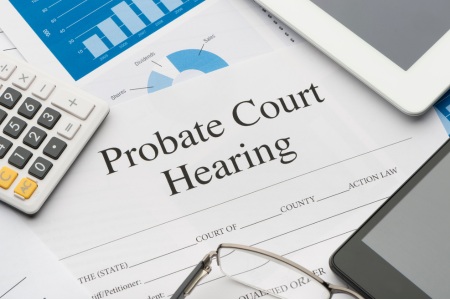
Selling a House In Probate Texas Guide
Selling a house in probate in Texas can seem a little intimidating, but if you have the right guidance, the process is both manageable and straightforward. For the seller dealing with a probate property, following each aspect of the probate law is important as a misstep can result in financial consequences or even lawsuits. This comprehensive guide looks at the details of selling a house in probate in Texas, whether you’re the designated executor, heir, or seller.
Content
- Probate Sale Meaning
- Probate Process For Selling Real Estate in Texas
- When Can The Executor Sell The Probate Property?
- Can You Sell A House Before Probate Is Complete in Texas?
- Do You Need to Go Through Probate to Sell an Inherited House in Texas?
- Probate House Sale Issues
- Options You Can Consider When Selling a Probate House in Texas
- Probate House Sale Frequently Asked Questions
- Easiest Way To Sell A House In Probate In Texas
Probate Sale Meaning in Texas
A probate sale of someone’s estate occurs when a loved one dies and their inheritance – including personal property – is distributed according to what is stated in the decedent’s will. If no will exists (an intestate estate), the assets are distributed according to state law.
In a probate sale, the house is sold by the executor of the estate. This person acts as the seller and uses the money to either pay creditors or distribute the profits to the beneficiaries. A probate sale ensures the decedent’s estate is managed efficiently.
Probate Process For Selling Real Estate in Texas

A probate procedure is a court-supervised proceeding where a court in Texas validates a deceased person’s will and appoints the administrator named by the decedent. Here is a breakdown of the probate process for selling real estate in Texas.
1. File probate with the local court
The first step is to file probate with the clerk’s office at the local probate court. This officially starts the probate procedure required to manage the decedent’s estate.
The court requires a formal application in the county where the probate property is located. There is an application fee, which differs from county to county. It’s important to ensure that you file the right probate application. The factors that determine which application you use include:
• Whether or not there is a will
• The value of the inheritance
• The type of assets
Once you file your application, it validates the decedent’s wishes and appoints you the legal representative of the decedent’s estate. A probate attorney can help you manage the estate.
Sometimes, the deceased person did not name an administrator. In other instances, the administrator has been disqualified, refuses to serve, has passed away, or has resigned. In these cases, any interested party with the right qualifications can file probate. However, an estate affidavit may be required by the court.
2. The court appoints an executor
The second step takes place when the court approves your probate application. You then receive the Letter of Administration. This letter is also called the Letter of Representation or Letters Testamentary, and it permits you to handle the decedent’s estate, including selling the house in probate. Now that you are legally recognized to handle the decedent’s estate and essentially act as a personal representative, you have the authority to sell all or parts of the estate.
3. Sell the probate real estate
The third and final step is to sell the probate house. This may not always be as straightforward as it seems as you must give careful consideration to the decedent’s assets and liabilities. Before selling any part of the estate, estate planning is critical. For example, you must list the decedent’s liabilities and money owed, the last income figures before the person passed, and any liquid cash. You should also get the property appraised to determine its market value.
Remember that as you manage the sale, you are obligated to continue paying property taxes and insurance. You may also need to maintain the inherited property. If fixes are needed, you may need to make all the necessary repairs, which can be costly. Most executors are not required to pay these fees themselves. They typically charge the estate for these expenses.
When Can The Executor Sell The Probate Property in Texas?
Once you have been appointed an administrator by the court, there is one final step you must complete before you can sell the probate property in Texas. You must file the estate Inventory and Appraisement form which lists all of the deceased person’s assets and debts. If the decedent has a lot of debt, you may require the help of a probate attorney to address all payments effectively. These can include medical expenses, funeral expenses, taxes, mortgage, credit card payments, and car payments. These outstanding debts must be paid to the creditors or dismissed by the court before profits are distributed to the rightful beneficiaries. If the house is in foreclosure, the bank may repossess the property. In this case, you may not be able to sell it.
If there are no outstanding bills to pay, then you can sell the probate estate once you receive your Letter of Administration. With all documentation in place, you can start the sales process: listing and marketing the estate.
Can You Sell A House Before Probate Is Complete in Texas?

In Texas, the court does not allow you to sell any part of the estate before the probate process is complete. The process ensures that the estate is managed according to legal guidelines. By jumping the gun, you may unknowingly make legal mistakes in selling the house. This can cause delays that may lengthen the probate timeline. The process can take a few months to two years (if there are complications). Lengthening the timeline can delay your ability to sell any part of the estate for quite some time.
There are cases where the court may allow you to sell a probate house before the probate proceedings are complete. However, you need the court’s specific approval.
Do You Need to Go Through Probate to Sell an Inherited House in Texas?
If you inherited a house from your parents or a family member, you still need to go through probate in Texas. Because probate validates the decedent’s will, you need it officially validated by the court before you can sell off any estate assets.
Remember that when a house has been willed to an heir, the heir must continue paying the property taxes while the probate proceedings are ongoing. The title must also be cleared. In Texas, taxation laws differ. For example, there is no inheritance tax. However, as the estate appreciates, you may have to pay a capital gains tax.
Any outstanding mortgage must be paid off before you can sell the house. In addition, you need proof of ownership, a death certificate of the decedent, title records, and tax records.
Texas Probate House Sale Issues

Selling a probate house in Texas can be a streamlined and manageable process when the guidelines are followed. However, the process does have some challenges.
Time-Consuming Process
The probate proceedings can be time-consuming as you must navigate legal requirements. Besides filing the paperwork and paying the application fee, you must wait for the court to grant you the Letter of Administration. You must also file an inventory of all the decedent’s assets and debts, which can be overwhelming if there is a lot of money owed.
Condition of the House
If you plan to sell the house the traditional route, it may be necessary to prepare the house so that it’s market-ready. A house that has fallen into a state of disrepair may need thousands of dollars in renovation costs.
Disputes Among Beneficiaries
All beneficiaries are typically part of the decision-making process of how the house is sold and at what price. If there are disputes about the appraisal process, the estate’s value, personal belongings, or how the profits are going to be distributed, this can complicate the sales process.
Paying the Decedent’s Creditors
An inheritance isn’t always positive. Selling a probate house may mean paying off any outstanding debts you inherited. Bringing the balance to zero can be an overwhelming process, and as the administrator, you may require the help of an experienced attorney.
Options You Can Consider When Selling a Probate House in Texas
If you decide to sell a probate house, you have a few options. Here are some you can consider.
Listing The Probate Property With a Texas Real Estate Agent
The most common path to consider is to list your probate house with a real estate agent. Here are the pros and cons:
Pros:
• Expertise and Knowledge: Real estate agents often have years of experience with probate sales and can provide information and advice about the process. They’ll also ensure that the estate is competitively priced and matches housing market prices.
• Advertising: Realtors can help you reach many potential buyers. Due to their experience, they have access to plenty of marketing resources.
• Convenience: A realtor is like your personal representative, so they can take on tasks like staging and negotiation. This allows you to focus on other responsibilities.
Cons
• Commission: In Texas, real estate agents command about 5-6% of the final sale price of your probate house. This reduces the amount you’ll get to distribute to the heirs or descendants.
• Delays: Markets fluctuate, meaning it may take months to find a buyer. Furthermore, once your house is listed, potential buyers may involve a lender to get financing. This can lead to unpredictable delays, such as waiting on the buyer’s approval from the bank.
• Hidden Costs: There are quite a few hidden fees when listing your probate house with a real estate agent. Some costs include closing costs, appraisal fees, and listing fees.
Selling The Inherited Property To a Family Member in Texas
If you don’t want the headache of listing the property and marketing it, you may choose to sell your inheritance to a family member in Texas. Here are the pros and cons:
Pros:
• Negotiations Are Often Simpler: When you sell the house to siblings or a family member, formal negotiations typically aren’t necessary. Plus, the family member is often aware of the property’s repair issues.
• The House Stays in the Family: Keeping the house in the family maintains all the personal and familial connections associated with the home. This may be important for any family member who grew up on the property.
• Faster Transaction: Selling the probate house to a family member may speed up the sales process as there are fewer legal complications.
Cons
• Financial: A family member may not want to purchase the house for the market price. This may result in disputes.
• Emotional Disagreements: Because there are no formal negotiations and no realtors to represent both sides, the sale could lead to disagreements due to misunderstandings or a confusing contract.
• Legal Errors: Sellers may tend to overlook legal guides, assuming the sale is going to be straightforward. However, without a lawyer, the seller (and buyer) may not be in accordance with Texas probate laws, leading to complications further down the road.
Selling a Texas Probate House As-Is To a Cash Home Buyer
Some sellers prefer to sell a probate house fast and as-is to a cash home buyer to avoid paying a capital gains tax or any additional property taxes. Here are the pros and cons.
Pros:
• Hassle-Free Transaction: Cash home buyers offer fast, hassle-free transactions. The main difference between this route and the traditional real estate route is that sellers won’t face the same delays.
• As-Is Condition: Companies who buy houses with cash like We Buy Houses Fast purchase them as-is, so sellers don’t have to sink themselves financially renovating their properties. This saves time and money for the seller, who can simply sell the home with all the personal belongings inside.
• No Repairs Needed: An inherited house may need a lot of repairs. Because this can be a costly undertaking, it may deter the seller from putting it on the market. However, cash home buyers purchase homes, mobile homes, condos, and single-family houses as-is.
• Cash Offer: Companies paying cash typically provide a cash offer for the probate house, eliminating things like loan approvals or financing delays. This process can speed up the sales process.
Probate House Sale Frequently Asked Questions
Can you sell a house without going through probate in Texas?
Yes, there are conditions that allow you to avoid probate in Texas. If the property was held in a living trust, then it would be passed on to the person named in the trust (the trustee) without having to go through probate. In addition, if the property was owned jointly – say by a surviving spouse – then the house would pass on to that person without going through probate. The deed would simply be transferred to the new owner. In cases where the property was solely owned by the person who passed and there is no living trust, probate proceedings are required.
Can you live in a house during probate?
You can live in a house during probate, but it depends on several factors, such as the circumstances of the case and the preferences of the administrator. If the administrator allows you to live on the estate during probate, then it’s possible. However, all parties interested in or affected by the estate should be notified. Moreover, details like utility bills and property maintenance need to be arranged.
Can you empty a house before probate in Texas?
Removing the decedent’s personal belongings can be complicated as there may be valuable assets that could be used to settle outstanding accounts. If the estate is solely owned by the deceased person and there is no living trust, the probate should be completed before any personal belongings are removed. However, if the administrator has legal consent from all beneficiaries and affected parties, the administrator may be able to empty the house of all personal belongings before the probate proceedings.
How long does it take to sell a house in probate?
The timeline can vary. If there are no complications, the probate proceedings can take roughly 60 days. However, if there are legal issues or complications with the estate or the person died without naming an administrator, the probate process can drag on for as long as two years. This means the estate may sit unoccupied until the process is complete.
Do all heirs need to agree to sell inherited property?
Yes, in Texas, all heirs need to agree to sell part or all of an inheritance. In addition, the administrator of the estate must notify all parties about the probate property so they can participate in any decision-making processes. While the administrator is tasked with selling all or parts of the estate and can make an executive decision, consulting with all heirs helps to avoid disputes and lawsuits.
Easiest Way To Sell A House In Probate
The easiest way to sell a house in probate is to go through a company that buys houses and pays cash. This allows you to skip the complications of renovating your home, listing it, and paying hidden fees.
These findings hold true not only in Texas‘s largest cities such as Houston, San Antonio, Dallas, Austin, Fort Worth, El Paso, and Arlington but also in smaller towns and rural areas across the state. Regardless of location, selling your probate house fast for cash is a streamlined process that can provide you with peace of mind.
We Buy Houses Fast is a local house-buying company out of Texas. We’ve built our business by buying houses for cash. We promise competitive cash offers without the hassle of dealing with real estate agents or banks. We operate throughout Texas and have bought many inherited houses from sellers going through the probate process. If you have further questions, contact us.
Resources To Help You Sell A Property In Texas
What Do You Have To Lose? Get Started Now…
We buy houses in ANY CONDITION in . There are no commissions or fees and no obligation whatsoever. Start below by giving us a bit of information about your property or call (214) 624-6404…

![Sell Your House Fast For Cash In [market_city] [market_state]](https://image-cdn.carrot.com/uploads/sites/52629/2023/10/Sell-Your-House-Fast-For-Cash-1080x800.png)
